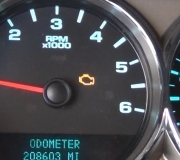The Engine Computer monitors hundreds of things and will set a diagnostic fault code when it detects a problem. About half of those things are relatively minor and will not turn on the Check Engine light. If the problem could adversely affect emissions, the code must turn on the Check Engine light. You can get an idea of the severity of the problem by how the light acts. If it goes off at times while you're driving, the problem is relatively minor. If it stays on until you stop and restart the engine, (even if it's intermittent and stops acting up), it's a little more serious. If the light is on anytime the engine is running, even if the problem stopped acting up, it's more serious.
The most serious problems are when the Check Engine light is flashing. That means stop the engine as soon as possible to do so safely. The cause of the problem is resulting in too much raw unburned fuel going into the exhaust system where it will overheat and damage the catalytic converter. That can turn a real simple problem into a very expensive one. Your description isn't clear if you drove it with the flashing light for half an hour, if it was flashing after you restarted the engine or how it was running, or why you were driving slowly. If you drove a half hour with the light flashing, there's a real good chance the catalytic converter has already been damaged, but lets hope it didn't overheat too badly.
Friday, July 11th, 2014 AT 8:18 PM


